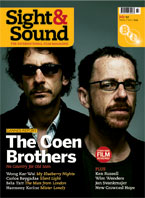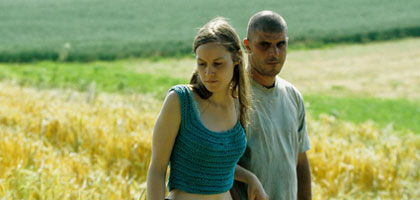Primary navigation

France 2005

Reviewed by Hannah McGill
Our synopses give away the plot in full, including surprise twists.
Flanders, the present. Young farmer André Demester has occasional trysts with the girl next door, Barbe. He has just been called up to fight in a foreign war zone; his friend Mordac is in the same regiment. Just before they leave, Barbe - stung by Demester's refusal to acknowledge her as his girlfriend - picks up another man, Blondel, and has sex with him in his car. He too is in Demester's regiment. The men leave for a desert location, where their numbers are quickly decimated by landmines and gunfire. They corner two snipers and open fire on them before noticing that they're children. Back home, Barbe realises she's pregnant by Blondel and resolves to have an abortion. She continues to have casual sexual encounters. Demester and Blondel take part in the regiment's gang-rape of a local woman; a soldier named Leclerq objects, and the others taunt him for his sensitivity. The three are then captured by enemy soldiers, among them the rape victim. She has Leclerq castrated, then shoots him dead. Meanwhile Barbe, increasingly depressed, is committed to a psychiatric hospital. Demester and Blondel escape, but are pursued; Blondel is shot, and Demester leaves him to die. Demester returns home, and tells the convalescent Barbe that the others are dead. Devastated, Barbe accuses him of abandoning Blondel on purpose. Demester admits that he did. He tells Barbe that he loves her. She says that she loves him too.
An early scene in Flanders shows a couple heading into a ploughed field, countenances grim and intentions clear. This set-up alone was enough to prompt knowing giggles from last year's Cannes press; raw alfresco sex is a Bruno Dumont trademark, and specifically recalls his controversial 1996 debut La Vie de Jésus. Flanders takes Dumont's favoured breed of character - lumpen, morose, troubled by vague flashes of spiritual awareness - out of blank rural existence and into an unspecified Middle Eastern conflict. While the film's humourlessness is a bar to emotional engagement, there's focus and intelligence here, conspicuously lacking in Dumont's 2003 misfire Twentynine Palms. Sparsely and elegantly shot, with punishing battle scenes, Flanders engages pertinently with the emotional dynamics of war and the concept of sacrifice.
Though the story is teasingly close to a classic wartime love triangle - like Casablanca, Jules et Jim or Pearl Harbor - the characters come shrouded in the mystery conferred by inarticulacy. The narrative too has a dreamlike choppiness, with crucial incidents left out. Such interruptions reflect the temporal confusion the characters experience: Demester through the chaos of combat, and Barbe, the girl left behind, through mental instability. The fact that the shaven-headed and dust-covered soldiers are difficult to distinguish from one another lends the war scenes added ambiguity - and what constitutes an enemy is further clouded. The first skirmish we witness is a fist fight between members of the same regiment, one black and one white. The soldiers gang-rape a local woman without knowing whether or not she is an enemy combatant; afterwards, the question troubles them mildly, until one concludes, "A hole's a hole." When they confront two snipers, they have already opened fire before they realise they are shooting at children. As in Dumont's previous films, physical action tends to precede conscious consideration; here, the irony is that this bestial, instinctive approach to existence is a desirable characteristic in cannon fodder. The reasons for the war, and even its location, don't concern its participants ("Where's the war you're going to?" asks Demester's neighbour, as if asking about holiday plans). There's no sense that those fighting have been misled or manipulated into it; their participation is passive, unquestioning. "You're not scared of dying? Of killing innocents?" asks the girlfriend of soldier Mordac. "There are innocents in every war. Children are always killed," Mordac flatly responds.
Meanwhile, Barbe's existence at home takes such hallucinatory leaps - from mild dismay at the departure of her two boyfriends to full-blown screaming madness and incarceration in an oddly grandiose psychiatric institution - that one would assume she was fantasising were it not for the fact that Dumont doesn't credit her with much self-awareness. Like a Lars von Trier heroine, Barbe becomes the film's sacrificial lamb, experiencing through either telepathy or imagination all the pain the soldiers block out. Barbe's situation recalls Joseph Heller's Catch-22: by rationally processing the horrors of the war, she loses all rationality. (Such sensitivity is implicitly a female disorder; we learn in passing that Barbe's mother also went mad.) The soldiers, meanwhile, stay sane by being mad enough to ignore the events around them. It's only when Demester returns that he vocalises his feelings about the experience of war: "It was hell out there."
Not that Barbe needs to be told. "I was there," she screams at him, "I know what you did!" Barbe's apparent psychic powers - she knows that innocent peasants were killed, and that Demester deliberately left another man to die - communicate the exposed and analysed nature of modern warfare. Her illusions about the glory of the war have not been shattered: she never had any in the first place. With botched operations and nefarious practices now picked over by the global media, the warm glow of patriotic fervour no longer comforts families and friends; soldiers return home tainted by suspicion.
John McCrae's poem 'In Flanders Fields' mourns the war dead in terms of the pleasures they have sacrificed: "We are the dead. Short days ago/We lived, felt dawn, saw sunset glow/Loved, and were loved, and now we lie/In Flanders fields." Demester and Barbe, by contrast, start out lying in Flanders fields: implicitly, they're already the dead. Their sacrifices are random, impulsive, meaningless, and they end the film back where they started, without poetry or poppies to glorify them.